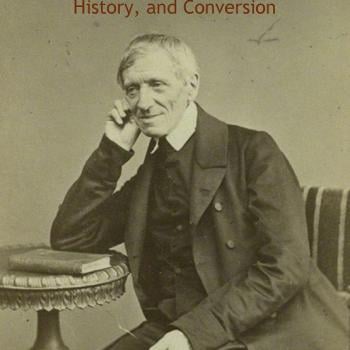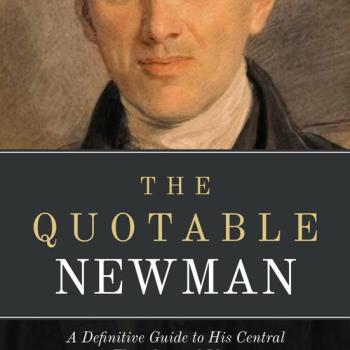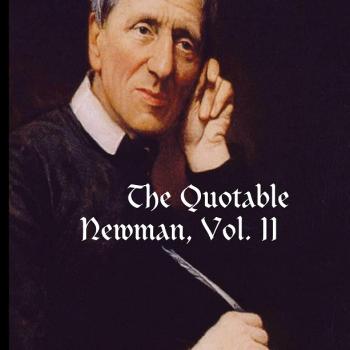Chapter 5 (pp. 45-50) of my book, Reflections on Radical Catholic Reactionaries (December 2002; revised second edition: 17 August 2013; slightly revised again in November 2023 for the purpose of the free online version). Anyone who reads this book should first read the following three introductory articles, in order to fully understand the definitions and sociological categories I am employing:
Introduction (on the book page)
Definitions: Radical Catholic Reactionaries, Mainstream “Traditionalists,” and Supposed “Neo-Catholics” [revised 8-6-13]
Radical Catholic Reactionaries: What They Are Not [9-28-21]
If you’re still confused and unclear as to my meanings and intent after that, read one or more of these articles:
Rationales for My Self-Coined Term, “Radical Catholic Reactionaries” [8-6-13]
My Coined Term, “Radical Catholic Reactionary”: Clarifications [10-5-17]
Clarifying My Coined Term, “Radical Catholic Reactionary” [4-3-20]
This book is modeled after the method and structure of the French mathematician and Catholic apologist Blaise Pascal’s classic, Pensées (“thoughts”). Catholic apologist and philosopher Peter Kreeft described this masterpiece as “raw pearls” and “more like ‘sayings’ than a book . . . ‘Sayings’ reflect and approximate the higher, the mode of Christ and Socrates and Buddha. That’s why Socrates is the greatest philosopher, according to St. Thomas (S.T. III, 42, 4).”
*****
- Radical Catholic reactionaries claim that Vatican II espoused the notion of evolving, as opposed to developing doctrines (as condemned in Pascendi #26, etc.). Development of doctrine and evolution are two entirely and essentially different things. Vatican II was not an instance of the latter. I submit that many reactionaries have a dim understanding of development of doctrine — what it entails and doesn’t entail, its distinguishing characteristics, and so forth.
- The emphasis of Vatican II had to do with fresh approaches, methodologies, evangelistic or pedagogical strategies, and new ways of reaching modern man with unchanging Catholic truths — a laudable and thoroughly biblical outlook.
- We’re no more bound (not absolutely, with no exceptions whatever) to the exact terminology of Trent than we are bound to the exact terminology of Holy Scripture (“Trinity” and “Hypostatic Union” immediately come to mind). Both the words and the doctrines develop all the time, and the situations we find ourselves in demand fresh approaches, without yielding one bit on any point of orthodoxy. St. Paul wrote: “I have become all things to all men, that I might by all means save some” (1 Corinthians 9:22).
- St. Paul cited pagan poets and philosophers on Mars Hill, in Athens (Acts 17:16-34), in order to make a connection with his hearers. He took what they knew and proceeded to build upon the truth that was in them, up to Christian theology and the gospel. He even utilized an idol of sorts as an illustration of a point and a witnessing tool: the altar “to an unknown god” (Acts 17:23). He did all this despite there being nothing in the official decrees of the Council of Jerusalem just two chapters earlier giving Paul warrant to use such shocking, innovative, and “modernist” language . . .
- The general principle of finding common ground in both doctrine and language, insofar as possible without any compromise, is a very biblical and conciliar one. The Decree on Ecumenism from Vatican II states (italics added):
-
- We must become familiar with the outlook of our separated brethren. Study is absolutely required for this, and it should be pursued in fidelity to the truth and with a spirit of good will . . . In this way, too, we will better understand the outlook of our separated brethren and more aptly present our own belief.
-
- The manner and order in which Catholic belief is expressed should in no way become an obstacle to dialogue with our brethren. It is, of course, essential that the doctrine be clearly presented in its entirety. Nothing is so foreign to the spirit of ecumenism as a false irenicism which harms the purity of Catholic doctrine and obscures its genuine and certain meaning. At the same time, Catholic belief must be explained more profoundly and precisely, in such a way and in such terms that our separated brethren can also really understand it.
Note that the council didn’t teach: The language of Catholic belief from the Council of Trent must be explained more profoundly and precisely, whether or not it is in terms our separated brethren can understand or not.
- Likewise, in the statement in Lumen Gentium, 67, referring to Mariology, the council urged:
Let them carefully refrain from whatever might by word or deed lead the separated brethren or any others whatsoever into error about the true doctrine of the Church.
- It is wise to choose our words very carefully, depending on the person we are communicating with at the moment, and to exercise a considerable amount of flexibility, because people aren’t simply walking dictionaries or lexicons, and 1563 (like 1611, or even 1870) is not 2002.
- Do reactionaries wish to deny a place for dogmatic and doctrinal development altogether, and a “deeper understanding” of the faith? Or do they think it ceased (like some Orthodox hold) many centuries ago? This is no different from some uninformed brands of Protestantism. Many Protestants, however (such as myself, formerly), fully accept development in many aspects, especially with regard to Christology and trinitarianism, even in relation to the canon of Scripture.
- It is simply assumed that the teaching of Vatican II is a departure (corruption), rather than a Newmanian development of previous dogma and theology. This is by no means proven — much as reactionaries casually assume. The so-called “evolved” or “novel” doctrines can be synthesized and harmonized with traditional Catholic dogma. Apparently, many reactionaries have never read (or didn’t understand, if they did), St. John Henry Newman’s Essay on the Development of Christian Doctrine. There, the great Cardinal lays out the principles that distinguish a legitimate development from a corruption. If no seeds whatever could be found in ancient Church history for the emphases of Vatican II, a case might be made, but in fact, many can be found, and it should be noted that there aren’t many explicit seeds for the Assumption of the Blessed Virgin, or the Immaculate Conception, or original sin, either.
- Some reactionaries make the John Birch Society look like a flaming Leninist outfit. Many, no doubt, would have been Arians or Nestorians or Monophysites in the old days, or Old Catholics, with Dollinger in 1870: fighting the “liberal” innovations and corruptions of Nicaea and Ephesus and Chalcedon alike, which (so they would tell us) “threaten passed-down orthodoxy.” Down with development! Down with new and fresh approaches from the same orthodox Catholic standpoint (e.g., St. Francis, St. Thomas Aquinas, St. Ignatius Loyola, St. Therese of Lisieux, St. Cardinal Newman, Pope St. John Paul II, etc.), in order to deal with and better reach modern man and the secular society we find ourselves in. Down with increased sophistication and nuance and a proper, orthodox sense of social and theological progressivism.
- Reactionaries object to new terminology, such as Vatican II’s statement that the Christian Church subsists in the Catholic Church. But where is the term Trinity in the Bible? Where exactly can reactionaries show us the widespread use of the terms Theotokos or homoousion previous to their adoption at the councils of Ephesus and Chalcedon? In fact, homoousion was earlier associated with the Gnostics! So do reactionaries therefore reject it, and Chalcedon, too? This picayune, extremely exaggerated objection to terms smacks of the heretical spirit. The Marcionites, Donatists, Montanists, Nestorians, Arians, Monophysites, Monothelites, and all the rest always claimed that they were simply preserving the true tradition over against the (orthodox) “innovators.” Reactionaries follow in their skewed, bankrupt, jaundiced “tradition.” It’s a very sad thing.
- The emphasis and purpose of Vatican II was to re-think theology in ways that deal directly and forcefully with the intellectual currents of thought that have come about since the 16th century, so as to better reach (hence, the “pastoral” impetus) modern man with orthodox Catholicism and the larger gospel: held in common with our separated brethren. The Church has always done this: utilized new approaches and philosophies, insofar as they are consistent with its (always developing) doctrines and morals. St. Augustine utilized platonism; St. Thomas Aquinas “baptized” and “co-opted” aristotelianism for the faith (as have modern Thomists such as Garrigou-Lagrange, Etienne Gilson, Peter Kreeft, Ralph McInerny, and Jacques Maritain); Pope St. John Paul II used phenomenology in the same way.
- It was altogether to be expected that the liberals (fatally influenced by higher criticism, Protestant liberalism, and various relativist, existential, or ultimately irrational philosophies) would distort this clearly avowed and officially stated purpose and claim that the Church was thereby changing her doctrines: “progressing,” as it were, and coming out of the Stone Ages of orthodox dogma (as they see it), to the modern “enlightened” approach, in accordance with the zeitgeist, fashionable intellectual and moral fads, fancies, follies, and whims of the current era. Their fallacy lies in thinking that legitimate development of doctrine is no different than evolution or corruption, or essential change. They don’t seem to comprehend that differing approaches to evangelism and teaching (St. Paul said, “I have become all things to all people”) are not changes in the teachings themselves, but rather, in how they are set forth and defended.
- Who determines what is “novel” anyway? The pope and the bishops, or reactionaries? How is reactionary dissent and selectivity of what is to be followed different from what Luther maintained in 1517 and (especially) 1521? He wanted to stand there and say he knew better than the Church, and that it was “self-evident” that the Church was wrong in this and that teaching. Reactionaries vainly think that they can determine what is a legitimate development, apart from the mind of the Church and the official pronouncements of the magisterium? Likewise, Luther thought that merit and purgatory and the Sacrifice of the Mass were not legitimate developments of soteriology, prayers for the dead, and the Real Presence. The Church determines these things, not individuals. If the individual wants to dissent, then that is liberal cafeteria Catholicism and Protestant private judgment rearing their ugly heads again. Reactionaries may not be consciously taking this approach in those terms, but this is what it boils down to, closely scrutinized.
Related Reading
Vatican I on Papal Infallibility: “Ultramontanism”? [3-29-04]
Why Papal Infallibility Was Made a Dogma in 1870 [10-17-08]
Newman on Theological Liberalism (Tracts of the Times No. 73) [3-5-11]
Kwasniewski vs. Cdl. Newman Re Pope- & Council-Bashing [12-3-20]
*
*****
*
*
Summary: Ch. 5 of my book, Reflections on Radical Catholic Reactionaries (December 2002; slightly revised in November 2023 for the purpose of the free online version).














